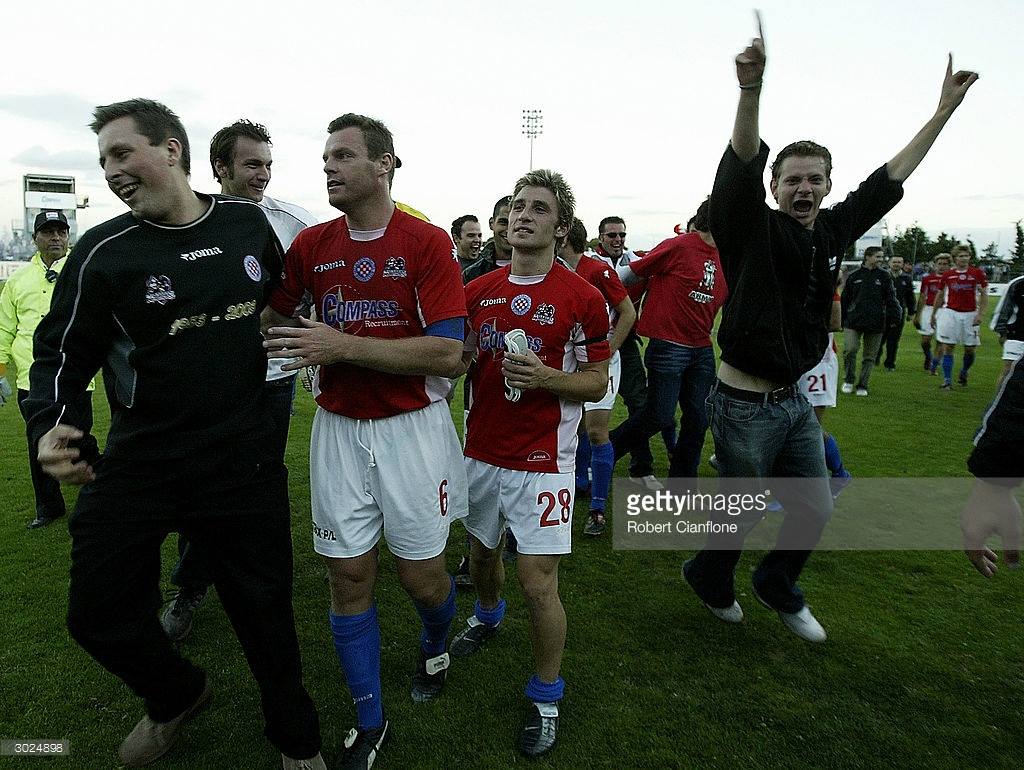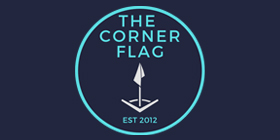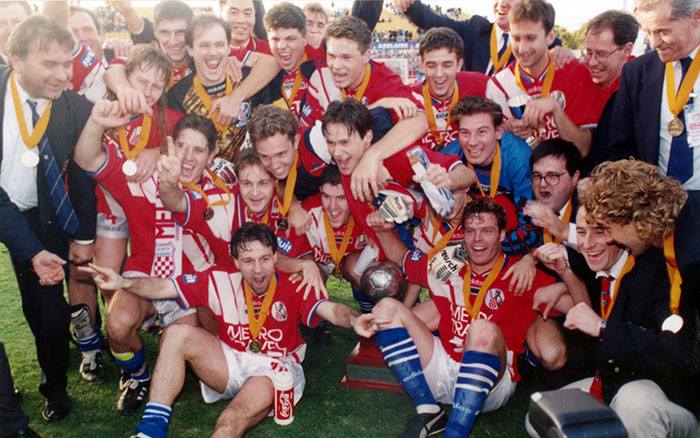Image: Melbourne Knights
Over the course of many football clubs’ long histories, there exists a period of time when all things seem to come together.
Players, coaches, officials and supporters alike play their part and witness a golden generation claim success, which is passed on down to future generations and lives long in club folklore. For the Melbourne Knights, that period of time occurred in the mid-1990s as the club shook off its bridesmaids tag and won back-to-back NSL Championships with one of the best sides ever assembled in Australian football.
In addition to the on-field triumphs, their success came in a period of time when Croatia became an independent nation, much to the delight of the club’s loyal following, which had promoted this idea through its support of a side that had become synonymous with the Croatian cause over the decades following their formation in 1953.
***
Ahead of 1993/94 season, the club was told by Soccer Australia that its name CSC was still too ethnic. The club made their position clear that it would not drop the name and even threatened to pull out of the NSL if the federation did not back down from its stance. Finally a compromise was reached when the club decided to change its name to Melbourne Knights. Soccer Australia was pleased with the move, although what it didn’t know was the Knights was an acronym for Klub Nogometa i Gdje Hrvati Takmice Srcem (football club and where Croatians battle with their heart).
On the field, the club decided to go international in their search for a new coach and went with enigmatic Croatian Mirko Bazic, who had previous managerial experience in Canada as well as in his native Croatia with Dinamo Zagreb. While his English was limited, Bazic certainly made his intentions known immediately after touching down in Australia by claiming “Melbourne Croatia has been in two grand finals but has not yet won the championship, so that must be my aim”.
Bazic’s influence on the side was apparent as the newly-named Knights eclipsed all before them to finish top after 26 games with 16 wins, and in doing so claimed the minor premiership.
The star of that league season was undoubtedly the teenage goalscoring sensation called the V-Bomber. Seventeen goals in 20 appearances saw the 18-year-old crowned the Johnny Warren Medallist as the league’s best player despite missing a number of games through international duty with Les Scheinflug’s Olyroos. Those commitments prompted a memorable club vs country stoush on live television between the national Under 23 team manager and Knights president Ange Cimera, with the former selecting the star forward for a tour of Europe that coincided with the latter few rounds of the NSL season.
Viduka returned home in time for finals and a late and rare strike from de Amicis saw the Knights prevail 4-3 over two legs against South in another major semi-final between the old foes to book a spot in another home grand final at Olympic Park. There they faced Adelaide City and began the game on the front foot as Adrian Cervinski struck the woodwork.
However, things soon turned sour as Buljubasic was taken off injured and replaced by Silic after being on the receiving end of a crunching tackle from former Knight Mori, who by this stage was leading the line for Matic’s star-studded Zebras side, which included Socceroos defenders Alex Tobin and Milan Ivanovic – the latter marking Viduka out of the game.
As luck would have it, Mori grabbed the game’s only goal in the 68th minute as the Knights were condemned to their third grand final defeat in four years. Bazic stayed on despite vowing to leave after expressing his frustrations with the way the league was being run and structured, specifically voicing his discontent at the month off-season break.
The following campaign saw normal service resume as the Knights clinched their fourth minor premiership in five years, with Viduka again winning the Johnny Warren Medal in addition to scoring 21 goals in 24 games and pipping Mori to the Golden Boot. New players like Zoran Markovski, Joe Spiteri and Oliver Pondeljak had improved the squad, as had the likes of youngsters Danny Tiatto and Frank Juric, the latter taking over the mantle from Miller in goals and earning plenty of plaudits for his displays between the sticks. However, the Knights were dealt a massive blow mid-way through the campaign when veteran Biskic, the heart and soul of the team, accepted a lucrative offer to play in Malaysia.
His departure threatened to derail the Knights’ quest to win their first grand final, although Bazic was quick to bring in Croatian import Kresimir Marusic to the club. A technically-gifted midfielder like Biskic, the 26-year-old had, like Adzic before him, begun his career at Dinamo Zagreb, with Bazic confident he would have the desired impact. Direct qualification for the grand final was expected, however the Knights lost their two-leg major semi-final against City, with Mori once again having a telling role. This set up a make-or-break preliminary final against South Melbourne – a game for heroes to rise up and be counted – enter Viduka.
While Viduka’s four-goal haul against Liverpool on a sunny Yorkshire day in November 2000 was undoubtedly the finest performance of his career, his memorable hat-trick for Croatia against rivals Hellas on a rain-drenched night at Olympic Park in late April 1995 comes a close second.
The Knights were dealt an early setback when Danny Tiatto saw red 13 minutes into the contest for a late challenge in the wet. Despite the numerical disadvantage, Mirko Bazic’s men went on to record a famous 3-2 victory thanks largely to the heroics of Viduka, whose hat-trick that night is etched in Knights folklore.

A chance to rewrite the wrongs of the season before awaited the Knights as they faced Adelaide City once again, but this time in enemy territory at a packed out Hindmarsh Stadium. From the get-go the Knights were the better of the two sides, with City’s determination to keep Viduka quiet allowing the likes of Marusic, Pondeljak and Spiteri freedom to express themselves.
However, a goal was needed in order for history not to repeat itself, and the Knights delivered in the 36th minute. Marth, who had been appointed club captain following the departure of Biskic, stepped up to the occasion and opened the scoring by latching onto a cleared header and smashing a half-volley from 25 metres into the bottom left-hand corner of the net past a hapless Jason Petkovic in Adelaide City’s goal.
Buoyed on by the crucial strike, the Knights kicked on, and following some neat combination play from Viduka and Marusic, Spiteri tapped home a second to send the strong contingent of visiting supporters behind the goal into delirium. There was even time to add a third before the break, but Spiteri’s close range header hit the crossbar and bounced back favourably into the arms of a relieved Petkovic.
You would have forgiven many of the Knights faithful for fearing the worst at that point as flashbacks of previous grand finals and their lack of luck was evoked following that glaring missed opportunity. But it was not to be, with the visitors having the better of the second-half chances, while Mori was kept quiet and a shot from City’s Brad Hassell from outside the box clipping the top of the crossbar.
The end of 90 was greeted by joyous scenes on the pitch, touchline and the stands from those wearing red, white and blue. Marth jubilantly lifted the NSL trophy, ending years of heartbreak. Steve Horvat was named Joe Marston Medallist as he and defensive partner David Cervinski, two and a half years after the pair had led the North Geelong Warriors to VPL Grand Final success, managed to restrict Mori’s influence on the contest.
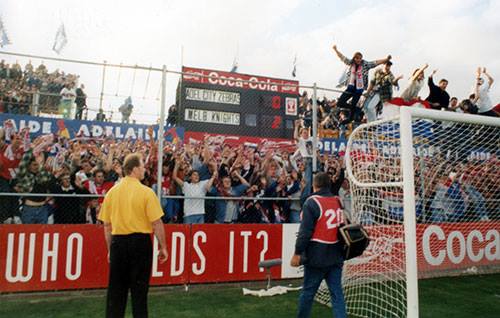
The return to Melbourne saw hundreds of people – who had in years gone by arrived at the gates of an alien land at the end of the world – greet their heroes at Tullamarine. Players were lifted on the shoulders of fans as chants of Croatia beamed through the airport.
The Knights’ success had not gone unnoticed back in Croatia, which by the summer of 1995 was on the verge of claiming victory in the four-year long conflict over independence. The pin-up boy of the club’s success in Mark Viduka rejected offers from superior European leagues by accepting an invitation from Croatian President Franjo Tudjman and joining his beloved Dinamo Zagreb.
Steve Horvat joined Champions League quarter-finalists Hajduk Split alongside North Geelong’s teenage sensation Josip Skoko, while Mirko Bazic and Kresimir Marusic both returned to their native homeland – although both men would return to the NSL later on, with Marusic winning the 1997 Johnny Warren Medal while at Sydney United.
The task of replacing the eccentric Croatian manager fell onto the shoulders of the largely inexperienced Ian Dobson, an Englishman who played for the club back in the 80s and was quickly earning himself a reputation as one of the country’s most promising young coaches as a result of his success in the VPL.
The 38-year-old turned to youth to replace the departing stars, with Canberra-born teenager Josip Simunic joining the club from the AIS, while fellow teen Tom Pondeljak made the short move to Somers Street from sister club St Albans Saints, as had 21 year-old centre-back Ante Kovacevic. Ice “The Iceman” Kutlesovski and the divisive John Markovski were recruited to fill the large goalscoring boots of Viduka.
Not many expected the Knights to go back-to-back, and such predictions appeared correct 14 rounds into the season as the club languished in mid-table on 21 points having only scored a lowly 14 goals, with midfielder Marth leading the scorers chart on three goals.
However, Dobson steered them on an impressive run of form, including 11 wins in the final 19 games. De Amicis, Buljubasic, David Cervinski, Kovacevic, ‘Paprika’ Markovski and Simunic conceded a league low of 28 goals – a ratio of one every game – keeping 16 clean sheets in the process.
However, a bad day at the office at Hindmarsh against City in Round 31 saw the defence dismantled 5-0 in the worst loss of the period. Despite this blow, the Knights brushed themselves off and won the first major semi-final on home soil by defeating minor premiers Marconi 1-0 at Knights Stadium thanks to a second half strike from Adrian Cervinski after Tiatto had earlier been sent off. A 2-0 lead at half-time in the return fixture effectively booked a home grand final as goals to David Cervinski and the season’s rising star Tom Pondeljak were enough, despite a second half onslaught from the Stallions, who got two goals back to level the contest.
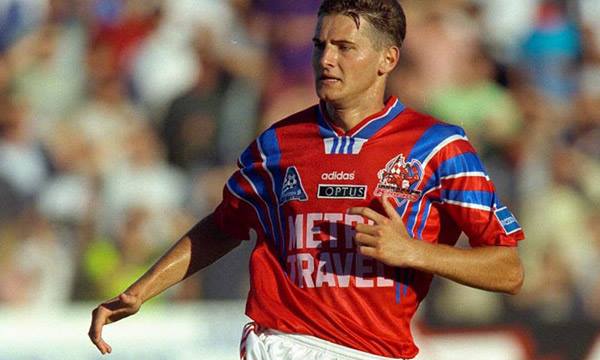
Marconi defeated Adelaide City to set up a rematch of the semi-final at Olympic Park and were looking to defeat the Knights for the first time that season, having drawn twice and lost three times in their previous five fixtures over the course of the campaign. The visitors were not helped when former Croatia forward Awaritefe was ruled out through injury, although the club vs country dilemma would once again dominate pre-match proceedings, with the Olyroos flying out to Canada for a qualifying tournament. National team duty saw Juric, Spiteri and Tiatto all controversially miss the decider as they helped Eddie Thomson’s men qualify for Atlanta.
Juric’s absence presented 20-year-old understudy Wilson Knezevic the opportunity to make a name for himself in the youngster’s biggest career game to date. A cagey open half saw both defences on top with Simunic showing signs of his future promise by nullifying the Marconi attack, although the visitors were themselves doing an equally good job at keeping the Knights forward line quiet.
At the beginning of the second period, Dobson brought on Buljubasic in place of Kovacevic as the Knights came out of the break the better of the two teams. Marth squandered a great chance to give his side the lead when missing the target and firing over from point-blank range. The skipper didn’t have to wait long to put that memory behind him as Buljubasic’s deflected cross into the area was met by the midfielder, who profited from a blunder from Marconi shot-stopper Bob Caitlin to score the opener.
Marconi went in search of an equaliser only to see their opponents double their lead in the 74th minute as a Lubo Lapsansky corner found substitute Joe Bacak, whose blocked shot found its way to Adrian Cervinski to slot into the back of the net.
Manfred Schaefer’s side halved the deficit four minutes later when Andy Harper’s header from the corner gave Marconi hope of a comeback. Knights players and fans alike faced an anxious 15 minutes trying to hold onto their lead as the visitors searched for a precious equaliser. That equaliser never came as the final whistle saw the home faithful flood the Olympic Park pitch to celebrate with their beloved victors, as the Knights finally won their first home grand final after three previous failures.
The man affectionately known as ‘Stabba’ claimed the Joe Marston Medal. He lifted afloat the NSL title for the second year running, in a game which concluded one of the most sustained periods of success in Australian football, given the club made five grand final appearances in six seasons, with their championship-winning sides containing 10 full internationals.
In forthcoming years the Knights struggled to return to their glory days of the mid-90s, unable to compete with the increased financial incentives given to players from new franchises such as Perth Glory, Carlton and the Parramatta Power. A period of mediocrity followed with the club losing Juric (Collingwood Warriors), de Amicis (South Melbourne), Buljubasic (Perth Glory) and Tiatto (Serie B) the following campaign.
Veterans Davidson and Kelic returned the following year, although their best days had passed. Simunic joined Hamburg in the Bundesliga, while David Cervinski and Lapsansky moved to Carlton and were joined at Princess Park by Marth the following season –the Knights legend departed Somers Street after almost a decade of service. The Knights struggled for much of the remaining NSL years, although the likes of Marth, Horvat, Bazic and Marusic all returned to the club, with Stabba becoming player-coach in 2001/02 and guiding the Knights to the finals.
As the curtain closed on the financially unstable NSL in 2004, the Knights bowed out of the national league on a memorable Sunday afternoon at Somers Street against rivals Sydney United in a celebration of the influence the two Croatian-backed clubs had on the NSL and Australian football, two decades after they were admitted into the competition.
But it was that Knights team from a decade earlier that is often regarded as one of the finest to have ever come out of the country.
That sentiment was echoed by uncompromising defender Zoran Markovski, who contends that “our team was probably one of the best teams Australian football has ever seen as that was a great generation of footballers”.
And so as the young Knights of today prepare for a crucial FFA Cup fixture tonight, there is no doubt that many at Knights Stadium will cast their minds back to that golden period of success and reflect on it as days of ponosa I slave (pride and celebration); a club founded by a group of hard-working migrants, who used it as platform to promote the idea of Croatian statehood, saw that desire fulfilled in that same period.
